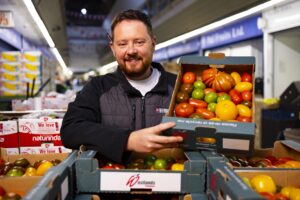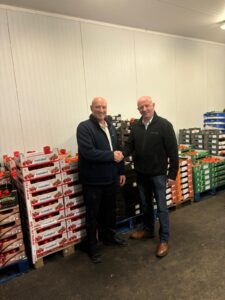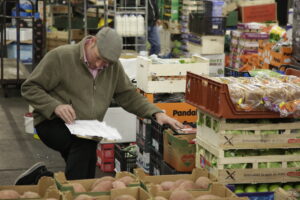An undoubted legend of London’s street market scene, having taken on a highly successful multi-generational family firm in Portobello Road, Tony Glasgow cemented his status after moving into the wholesale game at New Covent Garden Market to finish his career. He retired in July and when we caught up with him, he was slowly but surely getting used to his new sleep pattern after 47 years of increasingly early starts. Tony looks back on his time in the trade.
Tell us how you first got into the fruit and vegetable trade.
My grandad Charlie and dad Bill had always worked in Portobello Road. I was born in 1961, in Goldborne Road, Notting Hill, then we moved out to Wembley when I was 7 or 8.
I spent a lot of time on the stall from an early age and from around the age of 10, I can remember going to the old Covent Garden Market. We used to park out by the church. I still remember going to Kenny Brown’s – his family is still in the market now; Neil Brown Herbs. Kenny is Neil’s uncle. My first impression of the Market was that it was a fun place to go, I was going on a morning’s work with my dad and I loved that. It was a great time there, hard work for the boys pulling the barrows, but the camaraderie was there for everyone to see.
My dad wanted me to go to school, but he definitely thought more of work than education and as soon as the bell went to end the day, I’d get on my bike and ride all the way from Wembley to Portobello Road.
My last day at school, aged 16, was a Wednesday – we finished at 2pm and literally the following morning, dad had me up at 3am to start work! That’s basically where it all started.
Back then, because we were running stalls through the day, we wouldn’t get up until 3-3.30am. It was more of a day job, but we wouldn’t close up until 5pm and by the time we’d put stuff away and tidied up, we’d be getting home at six at night. Then you could spend the evening with your family. It was five and half days a week and long hours, but it wasn’t a job to me and none of the stallholders were any different - we all did those hours.
There were 60-odd fruit and veg stalls, all competing with each other and we were all market traders, all friends. We didn’t often socialise together as we were busy, but they were good times. I grew into the market and began to love it, then my dad became unwell when I was 25 or so. He started taking a couple of days off a week and by the time he passed away, aged 68 I’d already gradually taken the business over and was running it on my own with a couple of staff.
You had a hugely successful business, so how did you end up working in Nine Elms?
I had no intention to move into New Covent Garden to work. I was running my stall, very happy doing it and earning enough money for my wife Deana and me and our two kids. But 20 years ago or so, the street markets in London started slipping backwards. It wasn’t just Portobello Road, which is one of the most famous markets in the world, in a very vibrant area where people had money. But the supermarkets started to have free car parking areas, the wheel clamps started coming out around the markets and that started pushing the customers away.
I’d started serving the local restaurants and shops around the market. Because the Glasgow name had been around for such a long time and the chefs and retailers saw the consistent quality we had and asked me to supply them. I didn’t plan it, but I took a few restaurants on, it went from strength to strength and they started using me more and more.
In the end, I couldn’t do both and one was going against the other. The catering started to take over, so I went to the market office. I told them where I was in life and what I was doing and asked to retain my licence while I took six months out from the stall to see if I could make the catering side of the business work on its own – if it didn’t, I’d come back.
They could have rented it out to other people in that time, but they wouldn’t do it. Not only had the Glasgow family had its name on a licence for 118 years, I had sat on the market committee for 18 years and represented the fruit and vegetable traders, putting so much time in away from the family after a day’s work. I felt I had the right to ask, but they wouldn’t let me, so I handed my licences in at Kensington Town Hall and that was that.
I had sheds privately rented when I left Portobello and stayed there for a couple of years, then a good friend of mine Chris Roach (CSR & Sons) asked me to come in and work with him at New Covent Garden. That was my original move, I moved the business here and I helped Chris and he helped me. From there, about four years later, my son Nicholas (pictured below) came out of university and started coming to the market to help and that’s where his career In Covent Garden started. He took the answer phone off me and talked to the chefs, grew to love it and now he works at London Herbs.

I wound up at Nature’s Choice! I have to admit I don’t remember Martin’s mum (see comment from Martin below), it was a long time ago!. But everyone in Notting Hill shopped at Portobello Road and they all had their favourites, where they got a bit of banter. We’d keep the women happy and the kids would get an apple. I also met Martin’s wife Fiona – she used to work in a bakery in front of me and she was good fun. Obviously we didn’t know she would grow up to marry Martin, or that they would run Nature’s Choice together.
I thoroughly enjoyed working at Nature’s Choice and the way it has grown since I came in, which is down to a great team effort. We put our heads together and each individual there has played an important part in pushing the business forward. The owners stay a bit on the outskirts of it and do a fantastic job and the family works for the firm too. In those nine years, it did move on a hell of a lot.
If you get the right people in the right places, who are doing the right job and loving what they do, it’s hard not to move forward. Martin Dykes is no different to me – he loves what he does and gets that kick and buzz that takes you to work at 8 o’clock at night.
People tell us you were ‘last in, last out’ and describe you as a proper buyer. What do you think a ‘proper buyer’ is?
It’s the only way I knew how to buy. It always makes sense to view the goods, look at the quality and choose the quality you want to buy for what you would call the right price. I’d go in to see Perry at Premier, for example, and say I want juicing oranges today. He’d show me three or four options, I’d view all of them, then hand-select the one I wanted. He’d give me the prices and if he couldn’t do the price I wanted, maybe I’d just have to drop to the next one as we had to be competitive for our chefs as well.
That was no different to being on the stalls, where our competition was the other stallholders. We were trying to beat them all the time by keeping the price right.
It's changed so much. I don’t think programmes have done the Market any good. A lot of that is dictated by the chefs, of course, who want you to set up a three-month price so they know where they are going to be and organise their menu and margins. It’s promoted the idea that you can work three months ahead, so you can sit in the office and tell your wholesaler what you want, bash out a price and all he’s got to do is guarantee the quality. If he can do that and the product is there, he’s done his side of the deal.
To old-fashioned me, that’s not what markets are about. It takes the fun out of it. I could have sat in an office and bought over the phone, but that doesn’t make a salesman a salesman – he just writes the order down and that’s it.
I thrived on the competition, on bidding for product and trying to get it for 10-20p less than the person next to me. There was plenty of competition in Portobello Road then and if you did a good job, you could go back and have more scope to compete with everyone around you.
To succeed as a buyer, you need that competition; the challenge between you and the salesman is what makes it worthwhile. That’s where the buzz is, it’s what makes your hairs stand up on your arms. If I could say ‘that was a result, he wanted £3 for that item, but I’ve walked away paying £2.60’ then I’d be happy.
What prompted you to retire?
If I wasn’t married, I’d probably still be there, but I’m very much a family man and always worked towards a day when I get to retire. Since the kids have flown the nest, my wife has sat at home on her own every night I’ve gone to work. She has always 100% backed my businesses and worked with me on the stalls, as did her mum.
I’ve had a blast, but Deana and me wanted to finish work while we were both fit and well. We might travel around the world, we might not, but we know we can if we want to!
How do you look back on your career?
The greatest thing for me is I don’t think it would have really mattered if I worked for Sainsbury’s, a retailer down the road or in Covent Garden, I have always loved the business and thoroughly enjoyed what I have done. I never wanted to open a double glazing shop or lay carpets, I absolutely loved handling fruit and veg, understanding where it comes from and tastes like and what you can do with it. I loved the camaraderie of the industry and the fierce, but friendly competition between us all.
How do you view the industry now, as opposed to when you started out on the stall?
The world has moved on a lot in the last 15-20 years. The way you purchase fruit and veg, the way the wholesalers are, everything has moved on and you have to move with it, otherwise you get left behind.
Do I think it’s better now than 30 years ago? No, I don’t, but you have to look at the changes in the clientele. When the stallholders at Portobello Road started to go to pound-a-bowl, that was reflecting an influx of customers from different countries and cultures. It becomes a different market – Brixton Market for example became a lot more about handling of the fruit and veg and the supermarkets encourage people to pick their own, touch them, squeeze them; when I was trading I didn’t want people touching the goods. If you wanted 2lbs of tomatoes, I would select them, pop them in the bag and weigh them up. You wouldn’t have to handle them until you got home.
A lot of people would disagree with me, but a lot would agree too – that has been a large part of the downfall of street markets and it has definitely impacted on wholesale markets including New Covent Garden. Programmes have started the decline in footfall within the market. A lot of the bigger companies are happy to operate in the background now and it’s programmes that let them do that
And finally, what does New Covent Garden mean to you?
I wouldn’t have been able to run my stalls without a wholesale market, whether that be Western, Spitalfields or New Covent Garden Market. Dad and I used to use Western on the odd occasion, but Covent Garden was closest and easiest, so I really only went there.
It means everything to me as obviously I earned my living out of there, it’s what fed and housed my wife and kids. It’s the world, my second home. Buyers at New Covent Garden, 98% of them are second to none. You live in a night-time bubble and it’s that camaraderie. You see the same faces all the time – you can have a row with someone one day, but that’s business and it’s almost always forgotten in an hour’s time. That’s the great thing about the Market. Everyone knows each other and the vast majority of us get on.
There are so many young boys working there now who have young children, just married, mortgages to pay – that place is so important to them. I wish everyone could really understand that. They are all 35 or less and they’ve ploughed everything they have into that Market. They need the Market to survive. I’m not saying they couldn’t get on outside of the Market, but it is a bubble and they feed off each other. The Market feeds all their families' mouths too.
Tony was one of a dying breed of buyer

Martin Dykes, Managing Director of Nature’s Choice, has known Tony for 45 years and the connection predates that, as Martin’s mum bought her fresh produce from the Glasgow family’s stand in Portobello Road before he was even born. “Tony had the very best stall; no-one has got near it since he left the market,” says Martin. “I got to know him through Dave, who worked for him. Dave is still one of my best friends. “He was at Nature’s Choice for nine years as Director of Buying. The years of experience he brought to us was invaluable, we’ve grown a lot in the time he’s been here. He is a proper buyer, you just don’t get them like that any more. He had to see the product, he wouldn’t do it on the phone. Too many others will only do it on the phone and there’s far less emphasis on quality."
A buyer who always did it the right way

Bevington Salads owner and CGTA Chairman Gary Marshall, who has known and supplied Tony for several decades, says: “He was a staunch supporter of this Market and always believed in buying his produce from Buyers' Walk. Both when he was in Portobello Road and while he worked at Nature’s Choice, he was a very good buyer – extremely particular. He did it the right way – always had to look at what he was buying, and he was as hard a worker as they come, first in and last out many days. We’re sad to see him go, of course, but wish him a long and very happy retirement.”